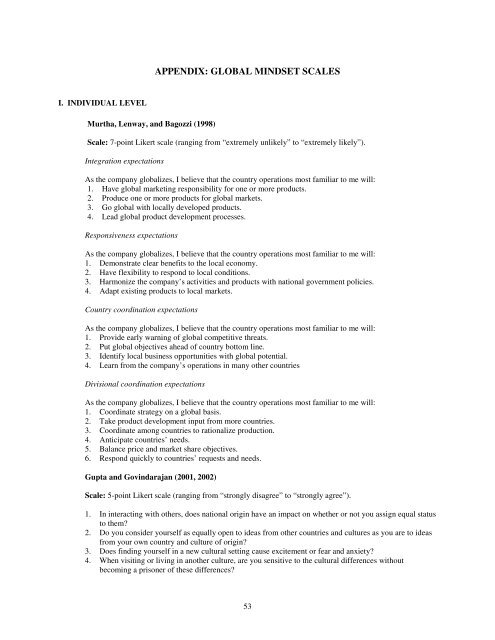What We Talk About When We Talk About “Global Mindset”
What We Talk About When We Talk About “Global Mindset”
What We Talk About When We Talk About “Global Mindset”
Create successful ePaper yourself
Turn your PDF publications into a flip-book with our unique Google optimized e-Paper software.
I. INDIVIDUAL LEVEL<br />
Murtha, Lenway, and Bagozzi (1998)<br />
APPENDIX: GLOBAL MINDSET SCALES<br />
Scale: 7-point Likert scale (ranging from “extremely unlikely” to “extremely likely”).<br />
Integration expectations<br />
As the company globalizes, I believe that the country operations most familiar to me will:<br />
1. Have global marketing responsibility for one or more products.<br />
2. Produce one or more products for global markets.<br />
3. Go global with locally developed products.<br />
4. Lead global product development processes.<br />
Responsiveness expectations<br />
As the company globalizes, I believe that the country operations most familiar to me will:<br />
1. Demonstrate clear benefits to the local economy.<br />
2. Have flexibility to respond to local conditions.<br />
3. Harmonize the company’s activities and products with national government policies.<br />
4. Adapt existing products to local markets.<br />
Country coordination expectations<br />
As the company globalizes, I believe that the country operations most familiar to me will:<br />
1. Provide early warning of global competitive threats.<br />
2. Put global objectives ahead of country bottom line.<br />
3. Identify local business opportunities with global potential.<br />
4. Learn from the company’s operations in many other countries<br />
Divisional coordination expectations<br />
As the company globalizes, I believe that the country operations most familiar to me will:<br />
1. Coordinate strategy on a global basis.<br />
2. Take product development input from more countries.<br />
3. Coordinate among countries to rationalize production.<br />
4. Anticipate countries’ needs.<br />
5. Balance price and market share objectives.<br />
6. Respond quickly to countries’ requests and needs.<br />
Gupta and Govindarajan (2001, 2002)<br />
Scale: 5-point Likert scale (ranging from “strongly disagree” to “strongly agree”).<br />
1. In interacting with others, does national origin have an impact on whether or not you assign equal status<br />
to them?<br />
2. Do you consider yourself as equally open to ideas from other countries and cultures as you are to ideas<br />
from your own country and culture of origin?<br />
3. Does finding yourself in a new cultural setting cause excitement or fear and anxiety?<br />
4. <strong>When</strong> visiting or living in another culture, are you sensitive to the cultural differences without<br />
becoming a prisoner of these differences?<br />
53









